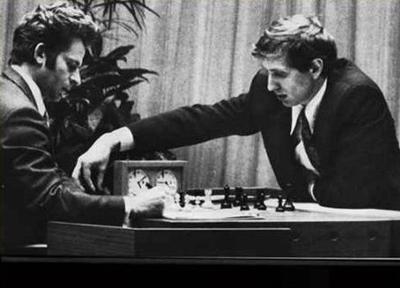Fisher Chess Spoon
by Anniesimi
(Kochi, Kerala, India)
CHECK MATE
by Wayne Bednersh
At the last National Spoon Convention in Colorado Springs, Ervin Goldman convinced me to acquire this unusual spoon and to write an article about it. Therefore, this article is dedicated to Ervin Goldman.
The pictured spoon is heavy 5.75" art deco style sterling spoon made about 1972. Sterling spoons were not hot collectibles during that time period so it is rather unusual to have a sterling spoon commemorating any event. This spoon, however, commemorates the very famous cold war Chess World Championship between American chess genius Bobby Fisher and the Russian Grand Master Boris Spassky which was held in Reykjavik,Iceland. This spoon is probably part of a limited edition as it numbered 252 on the back.
At the top of the spoon is a crown with a cross which is similar to that which is used on the king in chess sets. The king is the most important but also the least powerful and least mobile piece on the chessboard. Below the crown is a portrait of the new champion surrounded by his name "Robert J.Fisher". The stem says" Chess in Iceland FIDE.
The round bowl has the date "1972" in the center with "World Champion" surrounding the date. The spoon is marked with an unidentified mark which appears to be a crown above a keyhole above a pedestal. None of my books identified a manufacturer using this mark. In addition it say"JENS 925S". I thought that this might refer to the famous Danish firm of George Jensen,Inc.but the books I have did not show this as one of the variations in their mark. However the spoon is clearly made in the "Jensen style".
Most chess grandmaster are very intelligent in more than one field, but Bobby Fisher who was reputed to have had an IQ of 180 appeared to have no talents other than in the game of chess where he was the undoubted premier of his era. Some people even believe that he was an idiot-savant.
In the chess world, it is quite common for a grand master to play hundreds of simultaneous games against lesser players. An
interesting story is related by Frank S Meyer, the late senior editor of National Review:
"Fisher, on his way to the washroom, briefly paused at my board, for perhaps five seconds, and then walked on. A few months later, he visited me at my office, then located at the Marshall with difficulty. "Did you play Q-B5?", he asked.
I told him quite frankly I couldn't remember what I had played. He immediately set up the exact position to "help" me remember, and then demonstrated the variation I should have played to have secured a much more economical win. The main point is that he did not simply remember fleeting analysis as he had passed my board months previously."
One of the websites which I used described the following incident which may be a clue as to Fisher's abilities:
"Perhaps some of the following anecdotes will dispel the doubts of the unbelieving. Before playing the match with Spassky in Reykjavik, in 1972, Fisher toured Iceland for a few days get the feel of the land.
One morning he telephoned his old friend Frederick Olaffson, Iceland's only grandmaster. Both Olaffson and his wife were out of the house, and a little girl answered the phone. Fisher said, "Mr.Ollafson please." Olaffson's daughter explained, in her native Icelandic, that both her mother and father were out of the house and would return in the early evening for dinner. Fischer does not know a word of Icelandic and had to hang up with an apology.
Later that day, talking to another Icelandic chess player, Fisher remarked that he had tried to reach Olaffson. "It sounded like a little girl on the phone", he said. He then repeated every Icelandic word he had heard over the telephone, imitating the sounds with perfect inflection, so well, as a matter of fact, that the Icelander translated the message word for word."
I am not going to describe the actual games played, because I doubt that most spoon lovers would have any interest in that field, but a few of the events leading to the match are worth repeating.
The games were supposed to begin on July 1, 1972 but did not actually start until July 11, additional prize money conditioned on the match being televised, but Fisher also objected to the presence of the TV cameras.
Throughout the entire sequence of twenty games, both sides displayed many examples of psychological maneuvering designed to make the opponent lose concentration. Fisher demanded the removal of the TV cameras and to pacify him this was done for one game, but this dispute eventually ended with a lawsuit brought by Fox Television against him.
On the other side, the Russian leaders several times indicated that they wanted Spassky to quit in the middle of the series of games based upon the general acrimony, but he refused to quit on grounds that he was a good sportsman.
This particular World Championship win during the height of the Cold War was especially important because it was the first time in 24 years that any non-Russian was able to beat the Soviet Player. The political and psychological maneuvering before and during the match intrigued the entire world and lifted the staid world of chess to headlines of the television and newspaper reporting.
Of course, the American "win" made Bobby Fisher into an instant celebrity, but it was also psychological importance during the cold war maneuvering for political power.
(This story is copyright Wayne Bednersh 2001)









